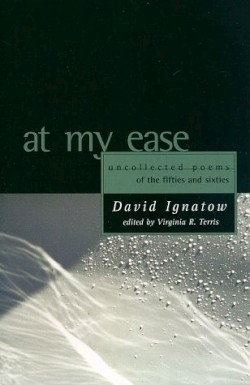At My Ease
Uncollected Poems of the Fifties and Sixties
“Get away from the absolute,” Ignatow warned himself in his notebooks. “Get back into tying your shoelaces or holding a newspaper or changing a diaper or combing your hair.” And so he did, assiduously avoiding or aborting any impulse toward transcendence, believing, as he noted elsewhere, that “life … refuses to permit a lyrical moment without a brutal one side by side.” Thus, where we might expect the poet to find cause for celebration or for that intensification of emotion which the “lyrical moment” affords, Ignatow unfailingly homed-in on the hard fact. Here are the final lines of “Today,” one of the previously uncollected poems in this new and sadly posthumous gathering of work from the 1950s and ‘60s: “Today I bend over my wife’s bed/ to talk to her in low, gentle tones/ to soothe her pregnancy and say gladly/ that our newborn will turn our fear/ into a living problem to cope with.”
In Ignatow’s world ‘to cope’ and ‘to be’ are synonymous verbs. There is no loftier human purpose than to face each erosive day with the stoic conviction that the human condition is conditioned by contingent.
Stylistically, Ignatow was as scrupulous in his adherence to the commonplace as he was in his avoidance of ‘the absolute.’ Figurative language is rare in these poems and rarely exalted. Like Robert Frost, Ignatow subscribed to the notion that, “The fact is the sweetest dream that labor knows.” And rather than falsify the facts with fancy or fanciful ornamentation, Ignatow invariably chose his figures with the same sense of limitations with which he circumscribed his emotions. Regarding his own life, he could find no more fitting figure than this: “there it is,/ breathing and simple and ordinary/ as a shoe which with time/ and hard wear will be discarded.”
David Ignatow was an unwaveringly honest man, which made him an uncommonly uncompromising poet. When he died last year, we lost a valued advocate for the dignity of the ordinary, the every day, the endless task of coping.
Reviewed by
Nick Bozanic
Disclosure: This article is not an endorsement, but a review. The publisher of this book provided free copies of the book to have their book reviewed by a professional reviewer. No fee was paid by the publisher for this review. Foreword Reviews only recommends books that we love. Foreword Magazine, Inc. is disclosing this in accordance with the Federal Trade Commission’s 16 CFR, Part 255.

